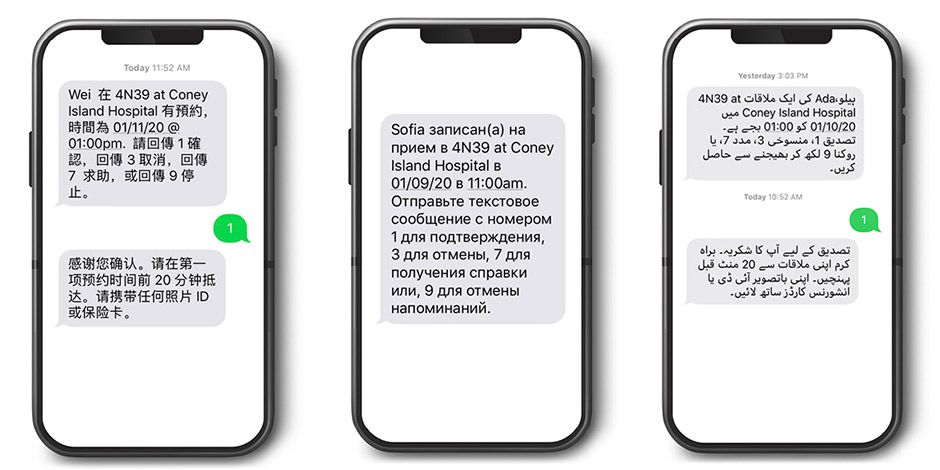NYC Health + Hospitals Expands Access to Text Message Appointment Reminders to Improve Communications with Patients
Now live at five facilities, appointment reminders decrease missed appointments by 6.1 percent Texts are offered in the 14 most common languages spoken by the NYC Health + Hospitals patient population Text message appointment reminders will be available system-wide by the end of 2020 and will include specialty care areas
Jan 09, 2020

NYC Health + Hospitals today announced the expansion of its text message appointment reminder platform. Live at NYC Health + Hospitals/Coney Island since July 2019, the new platform offered to patients in adult and pediatric primary care practices is now live at NYC Health + Hospitals/Elmhurst, Queens, Woodhull and NYC Health + Hospitals/Gotham Health, Gouverneur. It is offered in the public health system’s 14 most common languages spoken by the patient population, including Spanish, Urdu, and Mandarin. Since the past summer, text-message appointment reminders reduced missed appointment by 6.1 percent, helping to make appointment scheduling more efficient. This reduction represents approximately 1,207 appointments. Prior to using the text messaging platform patients would receive an automated voice recording to confirm their appointments. The new platform offers scheduling flexibility by allowing patients to directly connect to the call center for help rescheduling, expanded language options, and improved communication between patients and providers. Text message appointment reminders will be system-wide by the end of 2020 and will include other specialty areas.
“At NYC Health + Hospitals, we’re committed to meeting patients where they are and this includes utilizing all forms of communications to reach them during their busy days,” said Kaushal Challa, Chief Operating Officer of Ambulatory Care at NYC Health + Hospitals. “We understand that New Yorkers live hectic, unpredictable lives and providing patients the ease of canceling and rescheduling appointments is helping the City’s public health system take care of more people at their convenience.”
“This new era of health demands a different approach, one where providers must digitize the care delivery process to meet patient expectations and automate for efficiency at scale,” said Robbie Hughes, Lumeon Founder and CEO. “NYC Health + Hospitals is exemplifying this shift and setting the pace for large healthcare providers looking to improve outcomes, patient experience and efficiency across their enterprise. It’s exciting to support innovative healthcare systems make this much-needed transformation.”
Patients are automatically signed up for text message appointment reminders when they join the public health system and have the ability to opt-out of reminders, customize their communication preferences, or re-activate reminders at any time. Patients in adult and pediatric primary care are sent a reminder three days before the scheduled appointment and again the day before, if they choose to keep the appointment. Text messages ask the patient to either confirm, cancel, or ask for additional help. If a patient chooses to cancel, they are prompted to call a customer service line to reschedule their visit. In addition to primary care appointment reminders, patients are given a reminder for scheduled nutrition, nursing, and financial counseling appointments, which are often made in tandem with a primary care visit at NYC Health + Hospitals.
Powered by its Care Pathway Management (CPM) platform, Lumeon’s automated patient communication program allows patients to personalize how they communicate with their provider, ensuring that their appointment schedule is seamlessly communicated to them via SMS. If a patient doesn’t want to receive text messages, the system can also provide reminder phone calls using interactive voice response technology or reminder emails.
Since its launch in July, over 95,000 reminders have been sent. Patients have responded to 24 percent of reminder messages and responses include confirmations, cancellations, and requests for help or to reschedule. Fifty-three percent of reminders were sent in a language other than English.